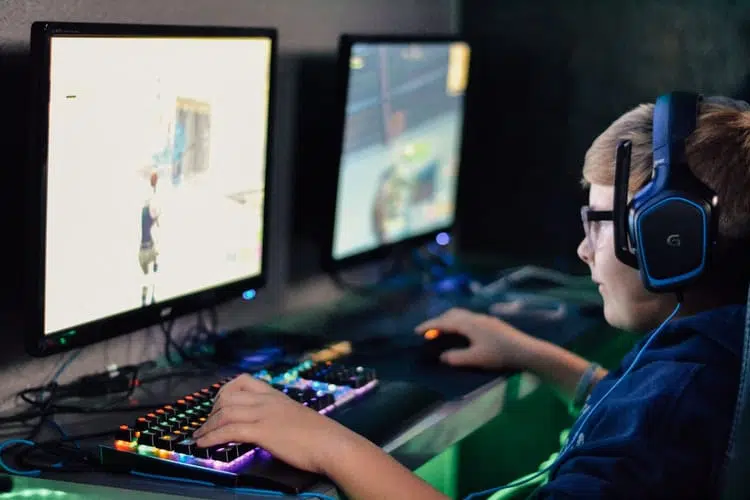Video games are fun… but when it comes to a child’s time spent playing video games, here are some unhealthy gaming habits to watch for.
Today’s guest post article comes to us from Kyle Ford from HDDMag.com and he writes about 7 unhealthy gaming habits to look out for and how to help your kids deal with them. Video game addiction is a real thing and just like spending too much time on tablets and mobile devices like iPads, Kindles, and iPhones, it can affect a child’s development. Parents need to always be vigilant in the technology and digital media that their children consume, including my own family. My kids spend a lot of time on their devices and this list of identifying unhealthy video game habits is a great place to start in determining whether your own children are spending too much time in front of the screen playing video games. Kyle, thank you for the great post and contribution to Windy Pinwheel.
Enjoy.
– Will
Advertisement
7 unhealthy gaming habits to look out for – and how to help your kids deal with them
21st-century childhood looks a lot different than the childhood of even 10 years ago. Studies show that children spend almost 6 hours a week playing video games. That’s a lot of screen time! And it’s increasing drastically. Schools have integrated games and apps to help with learning math and language skills. Most schools have computer literacy programs that also use online games, and classrooms have even developed their own social networks.
Though some forms of gameplay can improve brain function, as well as cutting down on stress, and even helping with ADHD, that doesn’t make your child immune to the dangers of video game addiction. If you’re worried about the amount of time your kids spend in front of a screen, keep these unhealthy gaming habits and signs in mind, and work to limit your child’s video game time.
-
Preoccupation with video games
First in our list of 7 unhealthy gaming habits is a preoccupation with video games. If you’re noticing a lot of your child’s conversations revolve around his favorite video games, you might be seeing the effects of a video game addiction. Spending quality time with your child, away from the computer and without the iPad, can help develop new interests. Remember to leave your phone at home if possible, or at least turn it off. Kids model behavior from their parents. -
Drop in grades
Extra time with a video game coupled with a drop in grades can signify an addiction forming and why it is among our list of 7 unhealthy gaming habits. Some game addicts report up to 14 hours a day in gameplay. That doesn’t leave much time for studying. Also, when you add in the loss of concentration, it can have an impact on grades. If you notice your child’s grades slipping, encourage time away from the game, and find fun ways to get back to learning. -
Increased irritability
If your child flies into a rage or temper tantrum each time you tell her to turn the games off, that is classic video game addict behavior. Treat it like any other behavioral problem, with reasonable limits and proportional punishment. If your child can’t handle having limits placed on video game time, it’s a clear indication to turn the game off for a while and encourage your child to find something else. -
Losing interest in other activities
Speaking of finding something else. Has your child lost interest in other activities? If you’re noticing a usually extroverted and energetic child keeping to himself and losing interest in other activities, he may need your help to reengage with old activities. Along with limiting screen time, spending family time outside, or involving a child in after-school activities like sports or art programs that don’t involve electronic play. -
Using video games to cope with bad moods
Kids deal with much stress these days, and plenty of it is due to technology. Between the demands of school, and the dangers of social media, children are more susceptible to stress than in previous generations. That increases the likelihood of depression and anxiety. There are even video games designed to help with stress, for kids, teens, and adults. However, when video games become a crutch for dealing with a bad mood, it becomes easier to indulge in addicted behavior that can be destructive among other unhealthy gaming habits. Instead, encourage your child to talk things through. Play physical games to burn off anxious energy, and spend more time in the sun. Endorphins produced by exercise has been shown to have a positive effect on mood disorders, even in children. -
Sneaking game play
Many parents choose to keep personal electronic devices out of the hands of children before bed. If you’re noticing your child is sneaking game against house rules, more drastic measures might be needed. Change passwords often, so kids can’t get into your phone or tablet after hours. You might draw up a chart to mark the amount of time your child spends on games. If they’re being dishonest, or unaware of exactly how much game time they’re putting in, it’s an excellent way to keep them accountable. -
Sleeping problems
The effect of solar-imitating LED lights on sleep has been well documented. Kids need more sleep than adults, so interrupting sleeping patterns with even the most casual games can have a significant impact on cognitive function throughout the day, including affecting a child’s ability to retain information, ability to regulate moods, and hand-eye coordination, among other things. Worse, sleep problems in childhood often escalate to insomnia as an adult. Turn all devices off when natural daylight fades, and develop healthy sleep habits.

What can you do?
If you’re worried about your child’s unhealthy gaming habits, there are things you can do to encourage healthier gameplay. The first thing you should do is to limit screen time. Health experts say kids should have less than two hours a day of screen time.
Create media-free zones in your home, and set rules for bedtime, busy mornings, and mealtimes, so the kids don’t have unpoliced access to their games. If your child has a personal device, like a tablet or phone, set a clear list of rules and responsibilities, as well as the consequences for breaking the rules.
Keep on top of what your child is doing in front of a screen, and spend some of that play time together. Encouraging more cooperative games is a great way to avoid obsessive and antisocial behaviors, chief among our 7 unhealthy gaming habits list. Have family game nights, and let everyone choose their favorites to play. Mixing up your gaming can help pull your child out of a game, and avoid addictive behaviors and unhealthy gaming habits. And playing with family keeps the play social and fun, instead of getting too intense.
Video games have become so ubiquitous that we use them at work, at school, and on our commutes and developing unhealthy gaming habits is all too easy. Too much screen time isn’t good for anyone, especially children with brains still developing. Too many video games can cause stress and anxiety, impact your child’s sleeping, and cause them to withdraw socially. Find ways to limit your child’s screen time, and watch for these 7 unhealthy gaming habits, to make sure your child keeps and healthy attitude, and doesn’t rely on video games for stress management, socialization, and fun.
Advertisement
Sponsor this article for $1.00






